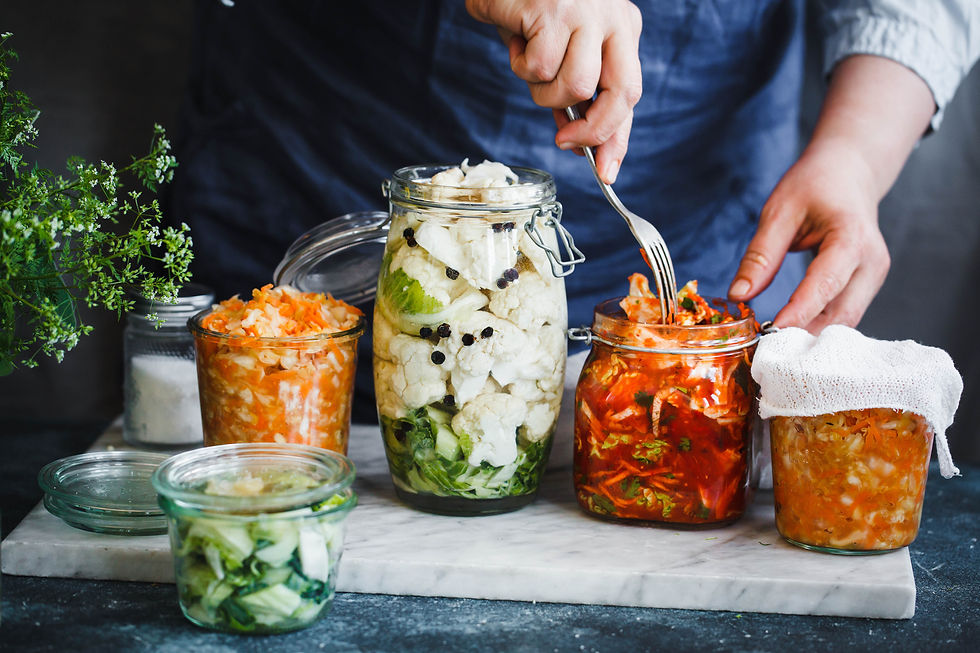Why Fermented Foods Alone Are Not Enough to Restore the Gut Microbiome After Antibiotics
- Helen Ross
- Aug 3, 2025
- 3 min read
Antibiotics can save lives, but they also disrupt the delicate balance of your gut microbiome.
Many people turn to fermented foods like yoghurt, kefir, sauerkraut, or kimchi in the hope of restoring gut health after a course of antibiotics.
While these foods can help support digestion and immunity, they’re not enough on their own to fully re-populate your gut microbiome after antibiotics.
Did you know a single course of antibiotics can decimate up to 9 gut microbial species? This can lead to extinction in some cases.
You might need to reconsider your strategy for restoring gut health after a course of antibiotics.

In this article, we'll explore why fermented foods and drinks alone fall short, and what you can do instead to support lasting gut repair.
Fermented Foods Offer Limited Microbial Diversity
Most fermented foods and drinks typically contain only a narrow range of microbes, mostly Lactobacillus, Bifidobacterium, or Saccharomyces species.
→ The human gut, however, contains hundreds of different microbial species, many of which are not present in fermented foods. The average Westerner will have around 200 different microbial strains present in their gut microbiome.
Although, there are thousands of different bacteria that could possibly contribute to each individual unique gut ecosystem. The MetaXplore GI Plus microbiome stool test can detect more than 28,000 different microbial species.
Antibiotics Wipe Out Key Gut Microbes
Antibiotics don’t discriminate - they kill both harmful pathogens and beneficial microbes. Some of the most vital microbes for gut and immune function may be lost permanently or take a long time to recover.
These include microbes that:
Produce short-chain fatty acids (SCFAs) that feed our colon cells
Regulate inflammation and immune function
Maintain a strong and selectively permeable gut lining
Fermented Foods Contain Transient Bacteria
The probiotic organisms in fermented foods often do not colonise the gut long-term.
Instead, they provide temporary benefits such as:
Supporting immune signalling
Crowding out opportunistic pathogens
But they modulate, rather than re-populate the gut.
Prebiotics and Fibre Are Essential for Re-growth
Fermented foods often lack the prebiotic fibres and polyphenols that feed your native gut bacteria. Without this food source, even helpful microbes struggle to survive.
To truly repair your microbiome, you need:
A diverse, plant-rich diet (e.g. vegetables, fruits, legumes, nuts, seeds, whole grains)
Prebiotic-rich foods (e.g. garlic, onions, leeks, asparagus)
Prebiotic supplements and targeted probiotics or polyphenols are often necessary
Time: full microbial recovery can take months or even years

A HEalthy Lifestyle MatterS
Beyond diet, the following also impact microbiome recovery:
Stress reduction (chronic stress impairs gut repair)
Good sleep hygiene
Daily movement (supports gut motility and microbial diversity)
Avoiding ultra-processed foods and sugar
Conclusion: Support Gut Recovery the Smart Way
Fermented foods are a valuable part of a gut-friendly lifestyle, but they are not enough to fully restore the gut microbiome after antibiotics. Focus on a fibre-rich diet, lifestyle changes, and targeted gut support to help your microbiome truly thrive.
Need Personalised Gut Health Support?
As a Registered Nutritional Therapist, specialising in gut health, I help clients identify the root causes of digestive issues, hormone imbalances, autoimmune diseases, and other chronic health issues, and create tailored nutrition plans that help to restore balance.
Book a free 15-minute discovery call to explore how I can support your journey to better gut health.
Or download my Free Healthy Gut resources to get started today.
Order your copy of The Simple Gut Reset Cookbook for more gut-supporting recipes.
For more information see: www.thewelllifelab.co.uk
Facebook: https://www.facebook.com/thewelllifelab
Instagram: the_well_life_lab
References
Langdon, A., Crook, N., & Dantas, G. (2016). The effects of antibiotics on the microbiome throughout development and alternative approaches for therapeutic modulation. Genome Medicine, 8(39). https://doi.org/10.1186/s13073-016-0294-z
Zmora, N., et al. (2018). Personalized Gut Mucosal Colonization Resistance to Probiotics Is Associated with Unique Host and Microbiome Features. Cell, 174(6), 1388–1405.e21. https://doi.org/10.1016/j.cell.2018.08.041
Suez, J., et al. (2019). The pros, cons, and many unknowns of probiotics. Nature Reviews Gastroenterology & Hepatology, 16(10), 605–616. https://doi.org/10.1038/s41575-019-0173-3
Reinisch, W., & Colombel, J-F. (2020). Fecal microbiota transplantation: what is the evidence for its use? Current Opinion in Gastroenterology, 36(1), 3–9. https://doi.org/10.1097/MOG.0000000000000602
David, L. A., et al. (2014). Diet rapidly and reproducibly alters the human gut microbiome. Nature, 505(7484), 559–563. https://doi.org/10.1038/nature12820







Comments